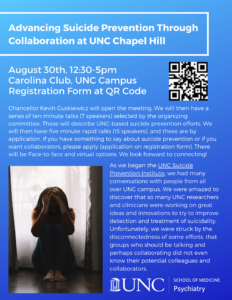Resources

The Department of Psychiatry Suicide Prevention Institute is hosting the ‘Advancing Suicide Prevention through Collaboration at UNC-CH’ summit, which invites UNC-CH researchers to disseminate their ongoing research with relationship to Suicide Research and Suicide Prevention. Please share within your groups and with any individuals who may be interested.
Chancellor Kevin Guskiewicz will open the meeting. We will then have a series of ten minute talks (7 speakers) selected by the organizing committee. These will describe UNC-based suicide prevention efforts. We will then have five minute rapid talks (15 speakers), and these are by application. If you have something to say about suicide prevention or if you want collaborators, please apply (application on registration form). There will be Face-to-face and virtual options. We look forward to connecting!
If you or someone you know is experiencing a mental health crisis, there are resources available to help:
| Who is in need? | How to contact? | Website with chat option |
| Emergency | Call 911 | Emergency assistance |
| Anyone | Call or text 988 | National Suicide Prevention Lifeline |
| Veteran | Call 800-273-8255 or text 838255 | Veterans Crisis Line |
| UNC students | Call 919-966-3658 or text START to 741-741 | CAPS 24/7 line |
| Black people | Call or text 800-604-5841 | BlackLine |
| LGBTQ+ youth | Call 866-488-7386 or text START to 678678 | Trevor Project |
| Trans people | Call 877-565-8860 | Trans Lifeline |
For more support or information on mental health, you can check out these resources:
- The American Foundation for Suicide Prevention (AFSP) website provides links to various websites and organizations that offer information and supports. You can visit their website at https://afsp.org/get-help.
- Bereavement and grief counseling can help you cope with the loss of a loved one or any other significant loss. You can find local counselors, support groups, and online resources at www.grief.com, www.griefshare.org, or https://afsp.org/ive-lost-someone.
- Finding mental health providers can be challenging, especially if you don’t have insurance or don’t know where to start. You can use online directories like www.psychologytoday.com or www.goodtherapy.org to search for therapists near you by location, specialty, insurance, and other criteria. You can also ask your primary care doctor, friends, family, or other trusted people for referrals.
- Mental Health GPS line is a toll-free helpline that connects North Carolina residents with local mental health resources. You can call 1-888-672-0365 to speak with a trained counselor who can help you find the right treatment options for you or someone you know.
- Many colleges and universities provide free or low-cost counseling to students through their Counseling and Psychological Services (CAPS) office. You can visit your school’s website or call them to find out more about their services and how to access them.
